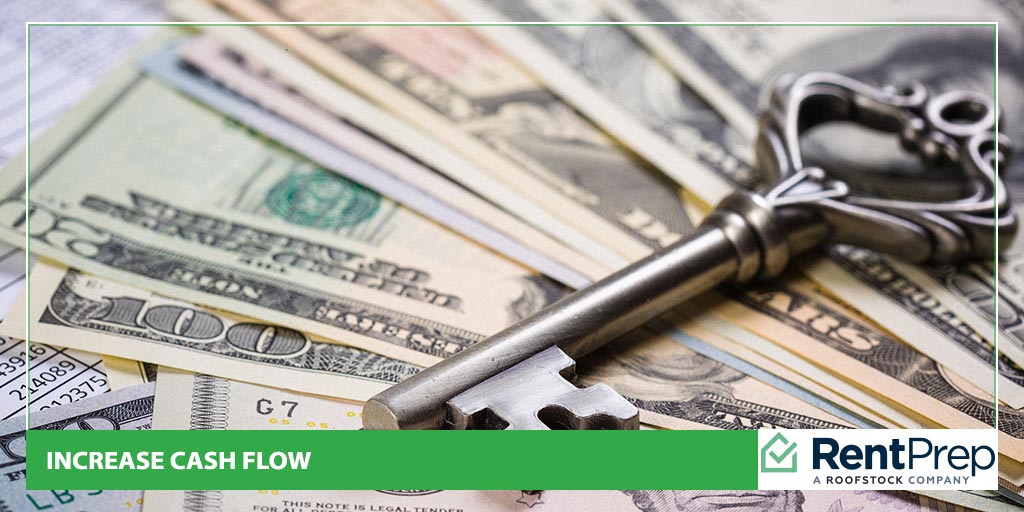
A big part of finding stability as a landlord is working out the balance between bills, purchases, and rent. It’s hard to determine what is right to charge, and it’s even harder to increase your cash flow without raising the rent.
Many landlords will simply do rent increases on their properties whenever they feel their business needs to earn more.
While yearly rent increases that reflect the changing market are reasonable, adjusting the rent only to make more money isn’t always going to work out in the long run. It may drive good tenants away, and it won’t correct problems in your workflow that are causing reduced profits.
It’s not easy to figure out how to increase cash flow from a rental property without increasing rent, but that doesn’t mean that it is an impossible feat. Today, we’ll cover 15 tips that may help you to make more money without adjusting any rent price points. These tips might not work for every landlord, but they’re worth a shot!
A Table Of Contents For Increasing Cash Flow
- Prepare For Tenant Turnover
- Address Late And Missed Rent Immediately
- Keep Long-Term Tenants
- Preventative Maintenance Matters
- Consider Refinancing
- Appeal Property Taxes
- Install More Efficient Fixtures
- Improve Before Setting Rent
- Update Doors And Windows
- Separate Utilities
- Regularly Review Paid Services
- Consider Allowing Pets
- Handle Problems Directly
- Choose Good Tenants
- Balance Durability With Costs For Materials
1. Prepare For Tenant Turnover
Every day that your property is left vacant is a day that your business’s cash flow is decreasing. Be prepared for tenant turnover periods, and put as much effort as possible into filling vacancies as soon as possible. This can save you a lot of money.
2. Address Late And Missed Rent Immediately

If you’re a new landlord or just trying to remain the nice landlord forever, you might have a hard time addressing late and missed payments as quickly as you should.
While there are, of course, times when tenants just make a mistake, you still need to address payment issues as soon as possible. Missed rent is an immediate (and large) knock to your cash flow. Any hesitation to address it will lead to long-term cash flow problems.
Charge late fees as appropriate, and send out notices for non-payment of rent as soon as possible.
3. Keep Long-Term Tenants
Keeping tenants at your properties for longer periods will help to improve your cash flow. Long rental periods lower your turnover rate, and that, in turn, improves your overall cash flow. Of course, it isn’t always as simple as asking tenants to renew their rental agreements!
You can improve your retention, however, by being the best landlord you can be. Keep communication lines open, respond to problems quickly, and make sure that your tenant is on the same page with you at all times.
4. Preventative Maintenance Matters
Do you have small plumbing issues that need to be resolved? Are the appliances at the property being given regular maintenance checks?
Doing regular, preventative maintenance can help to lower your future costs and improve cash flow. When you do these check-ups and little fixes, you can prevent something bigger from going wrong or find problems before they turn into disasters.
Early maintenance like this saves you money and improves your bottom line.
5. Consider Refinancing
If you have mortgages, loans, or other financial borrowings that must be paid each month, consider refinancing the way that these items are organized. For some people, refinancing can save them over a thousand dollars a year without changing much, and that can make a big difference in overall cash flow.
6. Appeal Property Taxes
Property taxes tend to increase each year, but this increase should not be so large that it causes your cash flow to stagnate or decrease. If you feel that your property is being evaluated too high, consider appealing your property taxes.
Remember, however, that this isn’t guaranteed to change anything and may have the opposite of your desired outcome.
7. Install More Efficient Fixtures
Installing high-efficiency furnaces and air conditioners can reduce utility bills, which is especially important if you are the one paying them. Even if your tenant covers them, this can entice tenants to stay longer if they get a better deal.
Another way you can improve the efficiency at home is to replace toilets and showerheads with low-flow alternatives that will reduce the water bill each month.
8. Improve Before Setting Rent
Before you decide what to set the rent at, make sure you do all of the renovations that you have been considering. While it can be tempting to get a rental property to an “okay” point and then do more renovations down the line, you’re likely to make more money if you do those renovations up front and then set your rental price.
Plus, leaving renovations for later will only make things more expensive as you’ll have to fix any tenant-created issues while you try to do additional renovations.
9. Update Doors And Windows
Another way to improve the efficiency, and thus lower the utility costs, of your property is to make sure that all windows and doors are reasonable up to date. Windows account for a huge percentage of all heat loss, so having energy-efficient windows installed can create substantial savings.
10. Separate Utilities
Speaking of utilities, are utilities currently included in the cost of rent at your property, or does the tenant pay them separately?
If the utilities are included, you may want to consider separating some, if not all, of the utilities from the rent. While you may need to lower the rent a little bit to accommodate this change, you are likely to have a better cash flow.
Even if your cash flow doesn’t increase exponentially, it will become more predictable since you won’t need to worry about seasonal fluctuations in water, gas, and electricity.
11. Regularly Review Paid Services
If you employ a property manager, pay for monthly finance services, or use any other recurring paid services, you will want to make sure that they are worth your investment. Many of these services can make day-to-day work easier, but you shouldn’t keep paying for them if you aren’t making use of them.
Every four or five months, take a few hours to consider how much you are spending on these services. Is the investment worth the reward? If it’s not, consider letting go of some of these benefits to improve your cash flow.
12. Consider Allowing Pets

If you’re having trouble filling vacancies or keeping long-term tenants in your properties, you may want to consider allowing pets. It can be scary to allow pets since they tend to cause more wear-and-tear, but pet security deposits can prevent this.
Allowing pets will entice more people to consider your apartment, and it may also help keep tenants in the apartment longer as there aren’t many landlords that are open to their tenants keeping pets.
13. Handle Problems Directly
When a tenant reports a problem, handle it quickly.
When your property manager thinks that something needs to be addressed, address it.
The fastest way to ruin your bottom line is to let problems fester. Festering problems can blow up into expensive problems, and that’s the last thing that you want!
14. Choose Good Tenants
We’ve already talked about the ways that keeping tenants in your property for longer periods of time can improve your cash flow. Having fewer repairs to make after a tenant moves out can also improve your cash flow since you can re-rent faster than if you need to make repairs.
By taking extra time to find high-quality tenants, you can ensure that your property will be kept in good condition. Additionally, good tenants are less likely to need to be evicted or go to court for other matters, so you’ll save time, money, and frustration on that front as well.
15. Balance Durability With Costs For Materials
When you are doing repairs and renovations for your properties, make sure that you find a good balance between durability and cost.
There are very cheap building materials out there that can be used for repairs, but these will wear out quickly and need to be replaced. By choosing materials that balance cost with durability, you’ll be investing in a more solid future cash flow.
You Have The Tools!
These 15 tips to increase your cash flow without raising rent show that it is possible to make more money without making your tenants pay more. Ultimately, it comes down to being a better landlord than you have ever been before.
When you invest the time into making sure that your tenant and properties are in a good position, you will be in a good position, too.

